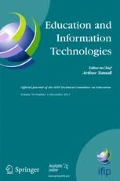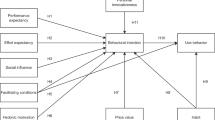Abstract
Within the context of Rogers theory of perceived attributes, authors propose a framework that can predict students’ motivation to adopt programming contest like ACM (Association of Computing Machinery) International Collegiate Programming Contest (ICPC). In this paper we investigate the attributes for adoption of programming contest in a social group comprising of (N = 1245) undergraduate engineering students from the regional finals of the contest held in India over a period of 3 years. The results revealed that student motivations are strongly associated with attributes like relative advantage, compatibility, ease of use, peer influence, perceived enjoyment and perceived usefulness. Overall, students expressed positive attitude towards adopting programming contests as it helped improve their problem solving and programming skills and overall employability. Both gender was in agreement that joining and winning programming contests is a status symbol.








Similar content being viewed by others
References
Agarwal, R. (2000). Individual acceptance of information technologies. Educational Technology Research and Development, 40, 90–102.
Atkinson, M., & Kydd, C. (1997). Individual characteristics associated with world wide web use: An empirical study of playfulness and motivation. ACM SIGMIS Database, 28(2), 53–62.
Benokraitis, V. J., Shelton, R. D., Bizot, B., Brown, R., & Martens, J. (2009). Reasons for CS decline: Preliminary evidence. Journal of Computing Sciences in Colleges, 24(3), 161–162.
Bhattacharya, A. (2018). Fewer than 5% of engineers trained in India are cut out for high-skill programming jobs. [online] Quartz. Available at: https://qz.com/964843/less-than-5-of-india-engineers-are-cut-out-for-high-skill-programming-jobs/
Blom, A. & Saeki, H. (2011). Employability and skill set of newly graduated engineers in India. New Delhi: World Bank.
Bloomfield, A. & Sotomayor, B. (2016). A programming contest strategy guide. In Proceedings of the 47th ACM Technical Symposium on Computing Science Education (pp. 609–614). ACM.
Bowring, J. F. (2008a). A new paradigm for programming competitions. ACM SIGCSE Bulletin, 40(1), 87–92.
Bowring, J. F. (2008b). A new paradigm for programming competitions. ACM SIGCSE Bulletin, 40(1), 87–91.
Brabham, D. C. (2008). Moving the crowd at iStockphoto: The composition of the crowd and motivations for participation in a crowdsourcing application. First Monday, 13(6). https://doi.org/10.5210/fm.v13i6.2159.
Bui, H. Q. & Van Zyl, L. T. (2016). Talent acquisition gamified: Insights from playing the game at PwC Hungary. Lund: Lund University
Cerny, T., & Mannova, B. (2011). Competitive and collaborative approach towards a more effective education in computer science. Contemporary Educational Technology, 2(2), 163–173.
Chavey, D., Monrey, T.L., Van Brackle, D., Werth, J. and Chairman-Bagert, D. (1991). Preparing a team for the ACM scholastic programming contest (panel session). In Proceedings of the 19th annual conference on computer science (p. 701). ACM.
Colkin, Eileen (2002). Cultivating next-generation IT talent, information week online (02/27/02).
Dagienė, V. (2010). Sustaining informatics education by contests. Teaching fundamentals concepts of informatics (pp. 1–12). Berlin: Springer.
Dagiene, V. and Skupiene, J., (2004). Learning by competitions: olympiads in informatics as a tool for training high-grade skills in programming. In Information Technology: Research and Education, 2004. ITRE 2004. 2nd International Conference on (pp. 79–83). IEEE.
Fisher, M., & Cox, A. (2006). Gender and programming contests: Mitigating exclusionary practices. Informatics in Education, 5(1), 47–62.
Gan, C., Kosonen, M. and Blomqvist, K. (2012), September. Knowledge sharing in crowdsourcing–it is more than motivation. In 13th European Conference on Knowledge Management. Academic Conferences Limited, 380.
Hromkovič, J. (2009). Algorithmic adventures: From knowledge to magic. Berlin: Springer Science & Business Media.
Iarcs.org.in. (2018). Indian computing olympiad - online programming contest - IARCS. Available at: https://www.iarcs.org.in/inoi/programming-contest.php. Accessed 8 Jan 2018.
Jenkins, T. (2001, June). The motivation of students of programming. In ACM SIGCSE Bulletin (Vol. 33, No. 3, pp. 53–56). ACM.
Jenkins, T. (2002, August). On the difficulty of learning to program. In Proceedings of the 3rd Annual Conference of the LTSN Centre for Information and Computer Sciences (Vol. 4, No. 2002, pp. 53–58).
Kearse, I. B., & Hardnett, C. R. (2008). Computer science olympiad: Exploring computer science through competition. ACM SIGCSE Bulletin, 40(1), 92–96.
Kelleher, C., & Pausch, R. (2005). Lowering the barriers to programming: A taxonomy of programming environments and languages for novice programmers. ACM Computing Surveys (CSUR), 37(2), 83–137.
Maloney, J.H., Peppler, K., Kafai, Y., Resnick, M. and Rusk, N. (2008). Programming by choice: urban youth learning programming with scratch (Vol. 40, no. 1, pp. 367–371). ACM.
Manzoor, S. (2001). Common mistakes in online and real-time contests. Crossroads, 7(5), 4–4.
Mayer, R. E. (1992). Teaching for transfer of problem-solving skills to computer programming. In Computer-based learning environments and problem solving (pp. 193–206). Berlin, Heidelberg: Springer.
Minds, A. (2016). National employability report: Engineering graduates, annual report 2011. Gurgaon: Aspiring Minds.
Moore G. C. & Benbasat I. (1991) Development of an instrument to measure the perceptions of adopting an information technology innovation. Information Systems Research 2(3), 192–222.
Papastergiou, M. (2009). Digital game-based learning in high school computer science education: Impact on educational effectiveness and student motivation. Computers & Education, 52(1), 1–12.
Qidwai, U., Riley, R., & El-Sayed, S. (2013). Attracting students to the computing disciplines: A case study of a robotics contest. Procedia-Social and Behavioral Sciences, 102, 520–531.
Raman, R., Achuthan, K., Nedungadi, P., Diwakar, S., & Bose, R. (2014a). The vlab oer experience: Modeling potential-adopter student acceptance. IEEE Transactions on Education, 57(4), 235–241.
Raman, R., Nedungadi, P., & Ramesh, M.V. (2014b). Modeling diffusion of tabletop for collaborative learning using interactive science lab simulations. In ICDCIT (pp. 333–340).
Revilla, M. A., Manzoor, S., & Liu, R. (2008). Competitive learning in informatics: The UVa online judge experience. Olympiads in Informatics, 2, 131–148.
Rogers, E. M. (2003). Diffusion of innovations (5th ed.). New York: The Free Press (2003).
Shilov, N. V., & Yi, K. (2002). Engaging students with theory through acm collegiate programming contest. Communications of the ACM, 45(9), 98–101.
Statistica.com. (2016). India - number of students graduated in computer science engineering stream by gender 2016 | Statistic. [online] Statista. Available at: https://www.statista.com/statistics/765577/india-number-of-students-graduated-in-computer-science-engineering-stream-by-gender/
Sun, D., Wang, L. & Zou, Z. (2013). ACM ICPC in China: Learning from contests. In Proceedings of the International Conference on Frontiers in Education: Computer Science and Computer Engineering (FECS) (p. 1). The Steering Committee of The World Congress in Computer Science, Computer Engineering and Applied Computing (WorldComp).
Tavakol, M., & Dennick, R. (2011). Making sense of Cronbach's alpha. International Journal of Medical Education, 2,53–55.
Teo, T., & Noyes, J. (2008). Development and validation of a computer attitude measure for young students (CAMYS). Computers in Human Behavior, 24(6), 2659–2667.
The Hindu Business Line. (2017). 95% engineers in India unfit for software development jobs: study. [online] Available at: http://www.thehindubusinessline.com/info-tech/95-engineers-in-india-unfit-for-software-development-jobs-study/article9652211.ece
Trotman, A., & Handley, C. (2008). Programming contest strategy. Computers & Education, 50(3), 821–837.
Verdú, E., Regueras, L. M., Verdú, M. J., Leal, J. P., de Castro, J. P., & Queirós, R. (2012). A distributed system for learning programming on-line. Computers & Education, 58(1), 1–10.
Verhoeff, T. (1997). The role of competitions in education (1997). Future World: Educating for the 21st Century.
Zheng, H., Li, D., & Hou, W. (2011). Task design, motivation, and participation in crowdsourcing contests. International Journal of Electronic Commerce, 15(4), 57–88.
Author information
Authors and Affiliations
Corresponding author
Ethics declarations
Conflict of interest
The authors declare that they have no conflict of interest.
Rights and permissions
About this article
Cite this article
Raman, R., Vachharajani, H. & Achuthan, K. Students motivation for adopting programming contests: Innovation-diffusion perspective. Educ Inf Technol 23, 1919–1932 (2018). https://doi.org/10.1007/s10639-018-9697-3
Received:
Accepted:
Published:
Issue Date:
DOI: https://doi.org/10.1007/s10639-018-9697-3




